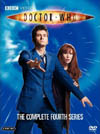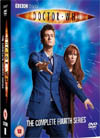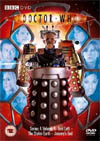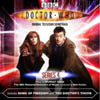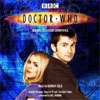DVD Extras (box sets only) include:
This story's plot has only one real reason for existence: to facilitate the largest Doctor Who character reunion party since "The Five Doctors" (story no. 130) while still disguising it as an adventure. One can then go down the list of guests and story elements to figure out which were good ideas and which weren't. Bringing back Sarah Jane Smith has to be one of the best moves, as Elisabeth Sladen manages to do the character better justice here with her limited screen time than she managed back in "The Five Doctors". Partly it's because she's in a good new place in her life, helped no doubt by having further developed on her own spinoff for a full season instead of being brought in under Jon Pertwee's Doctor's wings. Through her, K9 gets a brief and welcome cameo, while new characters like Luke and the computer "Mr. Smith" (too many unrelated Smiths and Jones's in the Whoniverse for this to be a good or original character name) are completely extraneous bafflements to those who aren't invested in her spinoff show. Now to the other spinoff, which ropes in the Torchwood gang. Their leader Captain Jack Harkness is a welcome addition to the story, being a proper Doctor Who character. Actor John Barrowman is now comfortably settled into his role, continuing the good vein he was in at the end of season 29 and being miles better than his initial appearances in season 27. Curiously, it seems to be a rare thing for Davies' to write a Doctor Who finale without him. The rest of the Torchwood gang seems to be a lot smaller in numbers than advertised - is this a needless spoiler showing who survives that series' latest adventures? Even at reduced numbers, one doesn't get enough of any of them to really get a sense of who they are or what they're about... and I have to say that taking precious screen time to show Gwen phoning some unknown off-screen friend or family member is a real waste of.... precious screen time. Martha Jones is also back, which is a decent decision. While the character is enjoyable in her own right, she also gets some of the most intriguing plot action all to herself. Bringing back UNIT with her seems logical.... but the lack of recurring UNIT faces makes the exercise not really worth putting on screen. Managing neither old faces like the Brigadier, Benton, Yates, or Sullivan, nor the newer ones like Colonel Mace, Captain Price, Sally Jenkins, Major Blake, or Captain Magambo, we get instead yet another roster of completely brand new faces.... again. The production team seem to think they've done something wonderful and exotic by showing New York's branch of UNIT..... yeah, not so much. I'll have the teleportation from New York to London to Germany though - it beats the airlines and airport line-ups anyday. Martha even comes complete with her mother.... and yawn.... and Davies has gone too far again. Donna's family members are still the current domestic semi-regulars, so they too are in this one, more for colour and perspective than anything else during the story proper. But of course, we'll take more of Bernard Cribbins' Wilfred Mott any day, and he continues to put a special charm into all his scenes here, whether important or not. Good show. Of course the production team think the really big excitement is in bringing Rose back.... NOT! I could've done without that character's return. Granted, Billie Piper's Rose proves interesting, useful, and well-acted in the previous story "Turn Left", but she really has nothing to do here except shoot one Dalek early in the story, and distract the Doctor into foolishness a bit later on. Really nothing that other characters couldn't do better. Is the roster full enough yet? No, why not pile on Rose's mother and her local hero Mickey Smith as well! Of course I'll have a return of Mickey any day, as this is the one character who makes Rose's violation of the parallel universe banishment worthwhile. Of course because actors Noel Clarke and Camille Coduri are known to be as "thick as thieves" it's not surprising that they show up together. It doesn't seem to be as logical for Camille's character to tote a gun into a war zone 'cause she's just got to find her daughter.... indicating yet again that the show has become too domesticated since 2005. Jackie Tyler should at least look as though she'd been through some kind of worse Dalek-infested hell in her own world to make her motivation believable.... and who'd want to do that to Pete's World? Sadly, Mickey doesn't have as much chance to show as much of his charm as we'd like, but still gets a bit in here and there. Jackie also gets a few choice humour moments in herself. Good to have you back, guys. Our cast of characters wouldn't be complete without the Daleks. Granted, we've probably seen more of them over the last four years than warranted, but since this story actually delivers the kind of massive scale operation and critical events that past Dalek stories made us feel like we'd missed, it becomes the most worthwhile Dalek story of the bunch. Good one. Not to be done with recurring characters, we get some amongst the Dalek ranks, including Dalek Caan from "Doomsday" and "Evolution of the Daleks" (story no. 186), and at long last the cult favourite Davros himself. Most worthwhile. New actor Julian Bleach recreates the role faithfully, managing to incorporate traits of past Davros actors Michael Wisher and Terry Molloy, and convince us that we're watching the exact same character all over again. Nicely done. If only the team had approached the Master with the same respect last year. Even more good reason to bring Sarah Jane Smith back: she at least is someone in the Doctor's ranks whom Davros can recognize and feel nostalgic about. As if all that isn't enough, we pile on the Judoon. Sweet sweet move! And unlike their look-somewhat-alikes the Sontarans, we get to see them in outer space, in their own realms of influence, subordinate to a new and cool looking race of aliens. THIS is what the show has been so begging for for so long. The Doctor and Donna have a good section of story to deal with here as well, getting the perspective of the galactic community at large (finally!), and working through a good sci-fi mystery. Brief mention of Callufrax Minor(r) is a dead give-away / homage / nod to the Douglas Adams story "The Pirate Planet" (story no. 99) from which this tale's sci-fi premise was partially pinched. I loved "The Pirate Planet". It's worth pinching from. Still not done with the roster. Back comes Harriet Jones, former Prime Minister. Yes, we all know who she is. Her presence is welcome, and thankfully she is far more proactive and together than in her previous story "The Christmas Invasion" (story no. 171) when faced with a Doctor-less situation. The story beat she commands is still far less than brilliant. In the midst of a massive action Dalek story, our heroes struggle with the challenge of.... a video conference call? You can tell this is written by a modern cell-phone / blackberry addict. The only truly good part here is ensuring that Rose is unable to join in, complete with her rising insecurity and a humorous comment from Bernard Cribbins. Hehehe. Don't claim you were in the TARDIS first either, Rose dear; that honour goes to Susan, Sir Ian Chesterton, and Barbara. And they'll have a salute. Plus, Sarah Jane deserves to smack you if she hears you trying to pull rank like that.
And thusly, we find ourselves building to one of the most mindboggling cliffhangers in the show's history, and certainly the best one for season 30. Was David Tennant's era about to come to a premature end? Not having yet seen "Time Crash" when I first viewed this, my best guess was that this was somehow the vehicle to add Peter Davison's Doctor to the roster. How sweet that would have been. Two David Tennants aren't quite as exciting, but are still cool. Oh yes.
"We will discover it together...."Once more in typical Davies fashion, the plot is less about engaging action stratagems between the Doctor and his antagonists, which ideally should occupy a few central story beats at some point. Instead it is more about discovering ideas, which is another most important aspect of sci-fi. Sadly, the cast seem to love to ramble through most of the sci-fi dialogue at a pace too quick for average audience members to grasp. I think in this particular story it really does show that the explanations are just convenient excuses for Davies to be able to shape the character interactions in ways he feels are ideal for the script. Most of the truly outstanding ideas have come from previous stories anyway.Our regular original Doctor has very little to actually, proactively DO in the final episode leading up to the climax, although he does at least get to spend a lot of quality time with Davros and Dalek Caan. A worthy consolation, but still a consolation. Their exploration of each other's character has not been this good since "Genesis of the Daleks" (story no. 78), and thankfully does not go as badly off-key as in "Resurrection of the Daleks" (story no. 134). One is tempted to wonder about Davros's grand plan in this one. Does it not on the surface seem to be as ridiculous as that of the infamously unwatchable Professor Zaroff in "The Underwater Menace" (story no. 32), simply destroying the world for no good reason? Has Davies turned one of the program's best villains into a copy of one of its worst? It's hard to maintain such a criticism though. The seed of the idea for what happens here can be traced right back to Davros's first appearance, and that idea was actually put to him by the Doctor as a test of character. He stated then that he would do it, and now here he is with the means. The science behind the "reality bomb" is a bit limited and primitive though. There's more than an electrical bond holding atoms and matter together. If you get really deep into quantum mechanics and metaphysics, you'll find that thought itself is a more basic building block in the universe, and there is a unified field of intelligence underlying everything making atoms possible. We expect the Daleks can't, without changing their own nature to stay sane, ever possibly make themselves aware of the nature of this field of intelligence being alive, because they can never escape from it nor exterminate it nor dominate it. Even as the structures of human beings are taken apart in this story, the law of conservation of life says that their conscious intelligence now continues on disembodied wavelengths. Even Douglas Adams saw a variation of this in 1978 when he included the means of the creation of the Mentiads in "The Pirate Planet". The reality bomb certainly won't make the Daleks the only form of life left in the universe. Like most villains, Daleks still have whacking great flaws in their philosophies and plans. Doesn't make them any less deadly though. As for it wiping out all parallel universes at once.... well, that's a bit hokey as well. I'd be very hesitant to claim that any region of space like the Medusa Cascade could somehow access them ALL. Many maybe, but not ALL. Probably only a small percentage in fact. Remember what thrives to create them in the first place: a function of thought within the unified field of intelligence that structures the universe in the first place, otherwise known as the act of choice. In Davies' own words from his season finale two years previous, "Every single decision we make creates a parallel existence, a different dimension..." How many different decisions are made simply in the course of this story, with all its different characters? Millions. Billions! Or more, perhaps. The Daleks probably win in some of them. They probably lose in many others. All those parallels coexist out there. How many Reality Bombs were successfully detonated in some of those parallels, and do they wipe out the universe we follow in this story? I think not.
"Exterminieren!"Martha gets a very cool sequence in Germany, which helps sell the Dalek invasion as a global problem. The sequence is good for adding some much needed variety of location to the story, without just going for another domestic house scene. Good one. The really good part is having all the German dialogue, with Martha participating fluently. This is so much better than TARDIS translation circuits wiping evidence of cultural differences out. Let's hear German and Judoon and all the other languages of the universe when they're spoken; it's so much cooler and more traveled.
Not appearing on the CBC broadcast at all are the goodbyes to the extended companions from our universe: Sarah Jane, Jack, Martha.... and Mickey. I love the fact that Mickey is back with us now, while Rose is banished once again. Now Mickey can appear in UNIT stories or in the spinoffs. Life is good. If Mickey joins the Torchwood gang as a regular... I'm going to have to start tuning in! Donna's fate deserves the lengthy screen time it gets, and is probably the most emotional of all the goodbyes in this story.... as it should be. Mind you, I neither endorse nor believe in the effectiveness of Timelord memory-wiping. First of all, it smacks of a lack of honesty. As for its effectiveness, truth will out every time, from the soul if it has to when the brain's got nada left. So, not the greatest design on an end for Donna, but very well executed and very moving. Bernard Cribbins does his best work of the story during this sequence; you can see his subtle disapproval and disappointment in his daughter's behaviour while he attempts to hold it in while in her presence, then afterwards he is sure to share his own feelings with the Doctor. What a lovely character, and nice that he is the last person the Doctor gets to talk to in this adventure.
International Titles:Deutsch: "Die gestohlene Erde"
Magyar: "Az ellopott Föld"
Français: "La Terre volée"
Русский: "Украденная Земля"
Italiano: "La Terra rubata"
Season 30 Rankings:
"The Stolen Earth" has become available on DVD. Click on the Amazon symbol for the location nearest you for pricing and availability:
Note: The full season sets contain commentaries, behind-the-scenes featurettes, and other extras. The smaller volumes only feature the plain episodes. Comments on this article are welcome. You may contact the author from this page:
|
